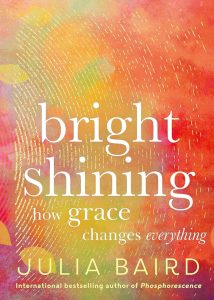In her new book Bright Shining: how grace changes everything, Australian author and broadcaster Julia Baird explores that most mysterious but necessary of human qualities: grace. Reviewed by Tracey Edstein.
Grace is not given
to implant in us a foreign wisdom,
but to make us alive
to the wisdom that was born in us.
J Philip Newell, Christ of the Celts
Like broadcaster Julia Baird’s earlier book, Phosphorescence: On awe, wonder & things that sustain you when the world goes dark (2020), Bright Shining offers insightful, luminous, scholarly and grounded prose – and joy.
Baird’s writing is the product of her deeply spiritual disposition, perhaps honed by bouts of serious illness, her academic prowess and her journalistic ability to engage deeply with people around the things that matter.
Grace could be thought of as a somewhat amorphous and elusive subject, although the hymn from which the title is taken invests grace with solidity and power:
Amazing grace! How sweet the sound,
That saved a wretch like me!
In fact, Baird’s deep dive into her subject reveals how grace can change everything, with forays into forgiveness, restorative justice, the issue of capital punishment in the US, grace (or its absence) in public life and more.
Forgiveness is a topic that resonates deeply and I believe Baird’s exploration will challenge many readers to reflect on this most thorny of concepts. She writes simply, “Few more daring ideas have ever entered the human situation.”

Image: HarperCollins.
Baird’s recounting of Chris Carrier’s story is a concrete example of ‘amazing grace’ and one that is difficult to forget. Briefly, 10-year-old Carrier, “a happy kid”, was abducted, shot and left for dead in the Everglades in Florida. Carrier survived but was broken by his horrific experience.
Eventually, and having found faith at 13, he married, became a father and worked as a youth pastor. Twenty-two years after his abduction, Carrier was told that the offender, McAllister, had confessed to his crime. “Would Carrier like to accept that confession? ‘Absolutely.’”
McAllister apologised to Carrier, and Baird quotes Carrier, “From that moment … it was absolutely easy for me to say, ‘Look, we’re in good stead now. I want you to know that I forgive you. I don’t want to hold you in that regard anymore, in fear or in anger. I want to establish a new relationship with you.’”
Three weeks later, McAllister, a forgiven man, died.
Baird supplies many more affecting examples, many invoking the faith of the forgiver. However, she writes, “I am not suggesting that true forgiveness comes only from faith. Rather, I am pointing to the fact that much forgiveness comes from a recognition of other people’s frailties, and humanity, as well as your own.”
Or as Sister Helen Prejean says, “Everybody is worth more than the worst thing we’ve ever done. That’s human transcendence.”
And it’s grace.
Baird’s forensic exploration of grace is very much grounded in her concern for the society in which we all live and move and have our being. Not only are we subject to information overload and a surfeit of bad news, but “we are getting lonelier, angrier and less tolerant. Trust in institutions and in each other has corroded. We report having fewer close friends. We are also becoming less empathetic.”
It seems that everything needs changing, and it is Baird’s contention that grace changes everything.
To return to Philip Newell’s assertion, grace is needed, right this very minute, to make us alive, bright and shining.
I heartily recommend Bright Shining: how grace changes everything.
Julia Baird, Bright Shining: how grace changes everything, HarperCollins 2023.
Ref: J Philip Newell, Christ of the Celts, Jossey-Bass (2008)
